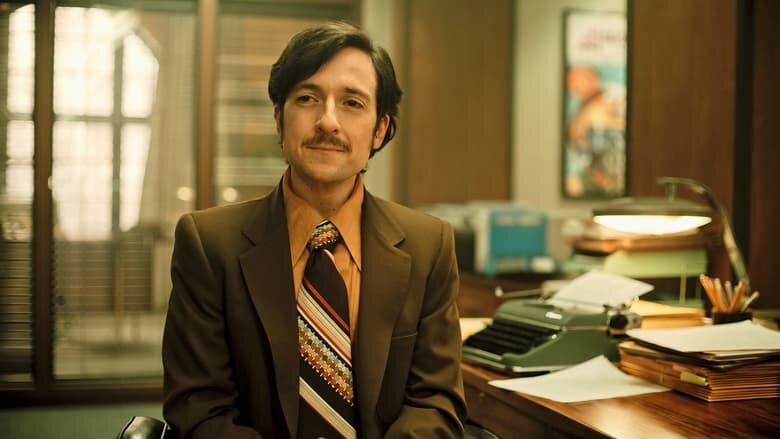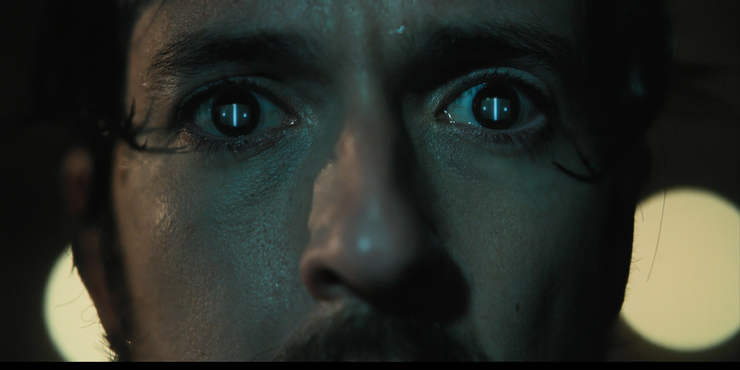Josh Brener as a young C.W. Longbottom in S2E6 of “Mythic Quest.”
“Mythic Quest,” the video game company workplace comedy created by the minds behind “It’s Always Sunny in Philadelphia,” continues to draw me into the web of Apple TV+.
“Sunny” occasionally granted its cartoonish cast of alcoholic narcissists moments of empathy—such as Mac’s episodes coming out as gay, or Charlie’s unrequited love for the waitress—Mythic Quest” elevates asshole pathos to an art form. Its characters are cartoonish narcissists, true, but only just long enough to lull you into a false sense of security before their humanity comes flooding through the screen. This switcheroo is largely the point of the show, according to star and co-creator Rob McElhenney.
Nowhere is this thesis more apparent than in the show’s recent two-parter on C.W. Longbottom, the writer of “Mythic Quest’s” titular game, played by F. Murray Abraham. For one-and-a-half seasons, Abraham’s hammy role has been little more than a caricature of the has-been science fiction writer—drinking, cradling his Nebula Award, and reminiscing about his days as a globe-trotting, STD-riddled womanizer. The most pathos he had received prior to last week was a surprisingly heartfelt episode B-story in which he and tester Rachel (Ashly Burch) debate whether story-heavy cutscenes or gameplay are superior, and come to respect one another’s perspectives. Even that arc ends on a gag, with Longbottom telling a group of children touring the office that “She showed me hers and then I showed her mine.”
But last week’s “Backstory!” and Friday’s “Peter” gave viewers the full Longbottom experience: the character at his best and his worst, his most empathetic and most execrable. The episodes differ greatly production-wise—the former being a lush “Mad Men”-esque period piece and the latter being more or less a bottle episode—but they follow similar arcs that begin C.W. on a high before putting him through an emotional gauntlet that ends on a redemptive high note.
“Backstory!,” introduced us to the artist as a young man, when he was still just “Carl,” a bright-eyed novice writer who’s just been hired by his favorite science fiction magazine as a junior copyeditor. (In a bit of inspired casting, he’s played by Josh Brener, the best friend on “Silicon Valley” who can’t stop failing his way to riches and recognition) He quickly meets fellow new hires and aspiring authors A.E. and Peter (Shelley Hennig and Michael Cassidy), and the three agree to become a “tripod” supporting each other on the path to literary success.
But Carl’s talent lags behind that of Peter and A.E., for whom he harbors a crush. They (gently) criticize his work for lacking vision, plot cohesion, or even sensible pronunciation (he insists the Tears in the title is pronounced “tAYrs” not “tEErs”—even though his friends note that he included a prominent crying scene).
Carl edits and rewrites and expands his story countless times without success, becoming increasingly embittered as A.E. sells a story into the magazine and falls in love with Peter. He reaches his lowest point when, drunk, he sees “Pong” on display in a store window and has an epiphany about the future of games and storytelling, which is promptly dismissed by his employer and his friends.
Young C.W.’s vision of the future.
Carl eventually publishes “Tears of Anaren” (now pronounced “tEErs”) to accolades, earning his beloved Nebula, but we discover he succeeded by plagiarizing Isaac Asimov. The episode flashes forward to C.W. as an old man selling chickens at a Renaissance Fair. He looks like a man broken by his unrealized potential, until he’s approached by Ian and programmer Poppy (McElhenney and Charlotte Nicdao) with an offer to write the backstory for their video game. The episode ends with a brief cut to young Carl in front of the Pong display, followed by the elder C.W. smiling in a moment of pure vindication.
It’s a heartwarming moment, but “Peter” immediately reminds us that C.W. is a vain and petty mess of a person. The episode reunites C.W. and Rachel, the latter having agreed to drive him on an errand under the expectation that she’ll learn something from the elder writer. But C.W. dashes her high hopes when he reveals they’re headed to the home of Peter, and that he plans to “f*ck his wife”—metaphorically, as A.E. died years ago. He plans to rub his former friend’s nose in “Tears of Anaren’s” success, even bringing his Nebula with him in a duffel bag. (Interestingly, he refuses to mention “Mythic Quest,” his most recent and ongoing success, because it’s a video game and not a book)
Although C.W. believes Peter (now played by William Hurt) has invited him over to apologize for “stealing” A.E., he quickly discovers that Peter expects him to apologize for abandoning their friendship. C.W. spends the second act of the episode becoming increasingly drunk, mocking his old friend’s lack of success compared to his brilliant wife, and generally showing his whole ass (at one point literally, when he defecates inside a desk drawer). When he discovers Peter is dying, he’s only momentarily taken aback before doubling down on his cruelty.
He passes out and wakes up in the guest bedroom, where he’s greeted by Peter and A.E.’s daughter (Shelley Hennig, again). She reveals that she tricked C.W. into a meeting under the hope that two old men “who share an incredibly specific set of interests” could mend their friendship in her father’s final days. Handing him a copy of “Mythic Quest,” she says that her mother admired C.W. for predicting the rise of video games and finally finding his niche.
C.W. apologizes to Peter for his behavior, and reveals that he’s read every book in his old friend’s obscure “Hammerfall” series. The episode ends with the two men sitting side-by-side, Peter reading the unpublished final volume of his saga while C.W. listens, enraptured.
Peter and C.W. reconnect.
What makes the two episodes such a resounding success, and C.W. so empathetic, is the way they use him to display the best and worst characteristics of the creative life. Consistently, C.W. is shown at his happiest when he’s writing and connecting with others; and at his unhappiest when he’s obsessed with being a writer and comparing his success against others.
Both episodes drip with overt and implied evidence of C.W.’s insecurity. The revelation in “Backstory!” that C.W.’s greatest success was plagiarized allows us to understand that he’s racked by (arguably deserved) impostor syndrome. In “Peter,” the fact that the location of the episode is a mansion paid for by his A.E.’s successful writing career adds a delicious layer of class anxiety. C.W.’s embarrassment over “Mythic Quest” combines both of these fears—the author can’t shake his belief that success in video games is nothing compared to success in books.
C.W. only finds redemption when he finds a suitable medium for his talent and later accepts that his successes don’t match the rigid standard of success he adopted 50 years ago. More importantly, he learns to put his ego aside and celebrate his friend’s creative work.
The episodes succeed because anyone who’s dabbled in writing and art can see themselves in C.W. Longbottom. The creative life is an obsessive one, and there’s an almost invisible line between obsession with art and obsession with being an artist. But it’s important to know where that line is, because it divides heaven and hell.



